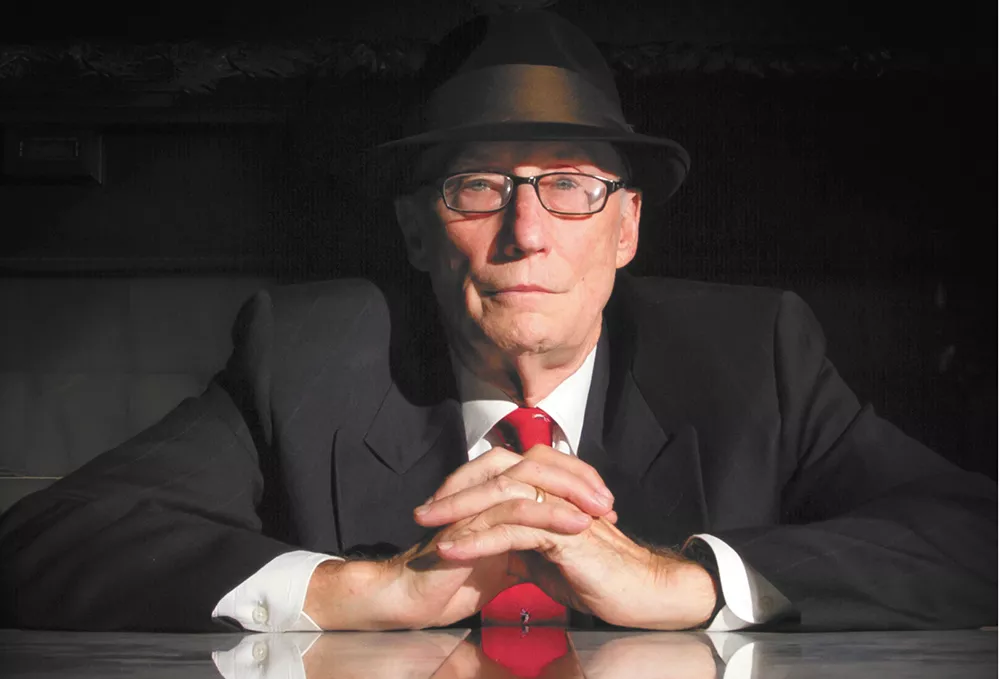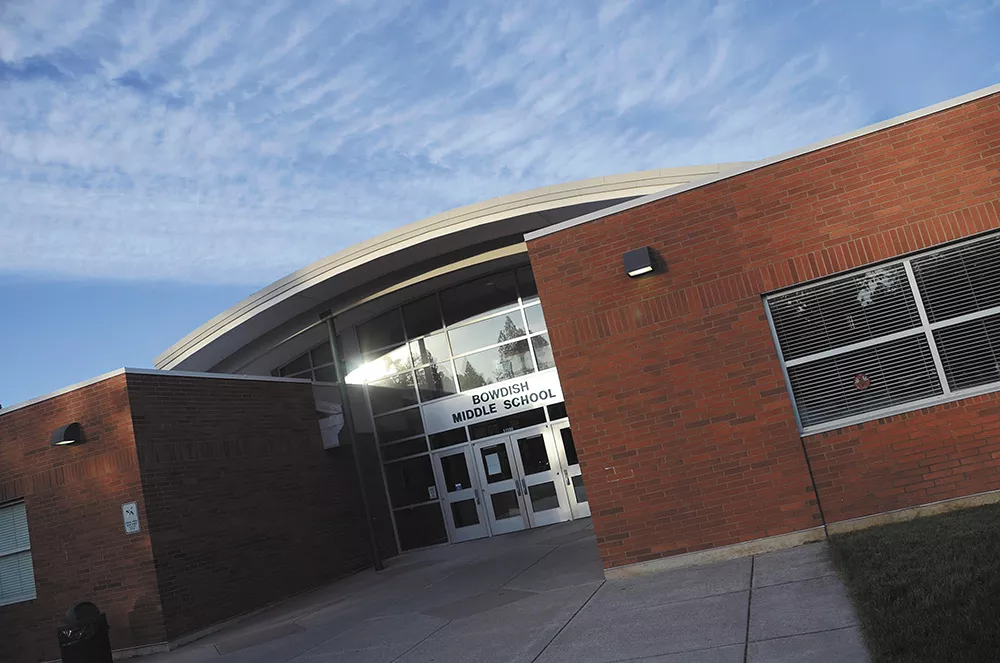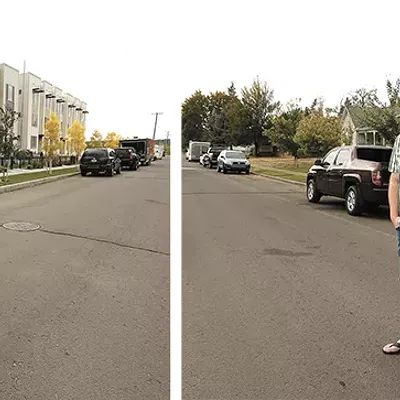Emily Keenan didn't tell anyone why she was really crying that day in the counselor's office. The 11-year-old revealed nothing about those occasions when, she says, her sixth-grade social studies and language arts teacher raped her after school. Nor did she report to the counselor that when her teacher, Anthony Cucinotti, snapped her bra minutes before the final bell, he also had whispered in her ear, "I'm gonna do it again."
Emily was in the school counselor's office because other kids who saw him touch her encouraged her to report it. They joined her in the office because they, too, wanted Mr. Cucinotti to stop teaching for good.
Finally, it worked.
For a period over 16 years, administrators in the Central Valley School District heard a series of complaints from other teachers, students and parents about Cucinotti's behavior in the classroom, including numerous allegations of him losing his temper, treating girls differently than boys, making sexual comments, touching girls inappropriately and having girls sit on his lap.
A pattern seemed to emerge: School personnel conducted an internal investigation, interviewing Cucinotti and the students involved before finding little evidence of wrongdoing. For what couldn't be dismissed, Cucinotti was issued warnings and letters of reprimand.
That didn't stop the inappropriate behavior, which continued until that day in 2009 when a teary-eyed Emily went to the counselor. Cucinotti was put on paid administrative leave soon after and then resigned.
"If there was ever a definition of 'deliberate indifference,' I think this case defined it, or reinforced what it can be," says Emily's attorney, Dick Eymann.
While Central Valley's handling of Cucinotti may be an extreme example of a district failing to protect a student from abuse by not fully investigating misconduct allegations, there are others. And when an investigation does find that a teacher committed misconduct, it often results in minimal discipline, as districts are wary of troubled teachers filing lawsuits backed by their powerful union. The state Office of the Superintendent of Public Instruction also fails to investigate some complaints of misconduct. And teachers, like Cucinotti, are frequently allowed to resign in the midst of an investigation, making it easier for them to find another teaching job.
"Their starting point is that the teacher is probably innocent. And it's easier to believe an adult," says Richard Lewis, a Spokane attorney who has represented victims of abuse in schools. "It's easier just to sweep it under the rug and attribute it to an exaggeration."
Emily filed a lawsuit in federal court against the school district in 2013 after asserting that Cucinotti raped her five times during the 2008-09 school year. After more than 60 depositions and more than 100 interviews with students who had classes with Cucinotti, the district agreed to pay Emily $2.5 million in a settlement earlier this year. All the money came from the district's insurance.
"Even now, not a day has passed without something I saw or heard taking me back to those horrible times in the back of his classroom," Emily says. "I have been validated, but I have a lifelong journey of healing."
Central Valley released a statement that it settled "to allow the former student to obtain whatever help and counseling she may need to heal and move forward as the result of these claimed actions of Mr. Cucinotti, and to avoid the burden, time, and cost to everyone of a lengthy trial." The district admitted no liability.
Cucinotti has never been arrested or charged with raping Emily. Spokane County deputies never interviewed him after taking Emily's statement in 2012, three years after the alleged incidents. Spokane County Sheriff's Deputy Mark Gregory says deputies were unable to contact Cucinotti, who had moved to California, before the case was declared inactive in 2013. Cucinotti was found by attorneys in Emily's lawsuit and deposed in 2014, during which he denied any sexual misconduct.
Cases like Emily's are not representative of the way all local districts handle complaints of teacher misconduct. Even Central Valley, for that matter, has procedures in place to prevent something like that from happening again. But that still hasn't changed a system that makes it easier for schools to assume a teacher is innocent — despite complaint after complaint indicating that children may be in danger.
A TROUBLED PAST
By the time Emily was born in 1997, Cucinotti had already been warned about his conduct at Greenacres Elementary School at least three times.
Cucinotti started teaching at Greenacres in 1992. His first anger outburst documented by the principal was in June 1993, and the principal recommended that Cucinotti consult administrators if he ever felt he was losing control.
Later that year, a student was "visibly shaken" and reported that Cucinotti hit him, records show. Cucinotti was given a documented verbal warning. A year after, he was issued a written warning by the school for screaming at a child so loud that other teachers were alarmed.
During the 1994-95 school year, a parent reported that she was concerned about Cucinotti's conduct with her daughter after the student stayed home for three consecutive school days and seemed troubled. When her mom asked why, the response led the mother to think "something was terribly wrong with going to school," according to a declaration from the mother filed in court. The mother went to the school and told the principal that Cucinotti wrote her daughter poems, called her "sexy," gave her notes, and once talked to her on the phone for more than an hour.
The district investigated, and for most allegations found that the evidence was inconclusive. The investigators determined that the student "misunderstood" Cucinotti's motive when he hugged her once, and that they were "convinced that his motive was not sexual." They finally recommended that Cucinotti see a counselor regarding boundary violations because of the long phone call.
In 2000 and 2001, Cucinotti was issued two more verbal warnings for anger outbursts at Greenacres before he transferred to Bowdish Middle School in 2002.
At the time, Emily was just entering kindergarten, and she'd recently started playing soccer. She loved animals — her childhood dream was to become a veterinarian. As she grew up, she learned piano and started dance lessons. In the summer, her family would go out to their cabin at the lake.
In December of 2003, a teacher at Bowdish went to Principal Bob Johnson with concerns that he saw Cucinotti reclining in his chair with his feet up, as a giggling girl sat on his left thigh whispering something in his ear. The concerned teacher said this was not an isolated incident, it had happened before, and that he had talked to Cucinotti about his behavior.
A district investigation ensued, and several other teachers reported similar concerns, according to court documents. The teachers pointed out that Cucinotti called a group of girls his "muffins," and that they all ate lunch together. At first they ate with the door open. As the school year progressed, according to witness depositions, he and the girls ate lunch with the door closed, toward the back of the classroom.
He was issued a written warning by the district and urged again to keep student-teacher relationships professional.
In 2006, Cucinotti was briefly put on paid administrative leave for reading a sexually suggestive time-travel story to his eighth-grade class. Students interviewed as part of the district investigation said that Cucinotti made girls feel uncomfortable by staring down their shirts. They said Cucinotti had a troll doll in class and would lift its skirt up. They said he called a male student "scarf-boy." Parents made similar allegations.
The district issued Cucinotti a letter of reprimand within a week, urging him to maintain a professional relationship with students and watch an instructional video. For the first time, the district notified the state Office of Professional Practices that reliable information existed suggesting Cucinotti engaged in "acts of unprofessional conduct." But Michael Pearson, then the CV superintendent, wrote a letter two years later, in 2008, to the OPP requesting that they suspend their investigation of Cucinotti because Cucinotti had complied with the district's directives. The OPP issued its own letter of reprimand to Cucinotti in spring of 2008.
Meanwhile, Emily still was enjoying elementary school. She looked up to her teachers. "They were always very kind and warm," she says. Her grades were good up until sixth grade. When she started at Bowdish Middle School as a sixth grader in fall 2008, she remembers she had a good group of friends. Cucinotti taught her fifth- and sixth-period block class.
"I actually liked him at first," she says. "We all thought he was really funny."
But she started noticing strange things. She says he would pass papers out to the boys, but he would have the girls come up to the front of the classroom and drop the papers so they would have to bend over and pick them up. When girls raised their hands, he would come over and rub their shoulders.
Emily feels tears fall gently down her cheek as she recounts being first raped in December 2008. Her voice remains soft, her eyes fixed to the left of the camera, where a lawyer sits during her videotaped deposition.
She remembers that Cucinotti told her to stay after school — something about one of her assignments. When the final bell rang, other students shuffled out of class. She called her mom and told her she was staying.
When she hung up the phone, Cucinotti told her to go to the back of the classroom by her desk. Then, according to her deposition, this is how the alleged rape unfolded: He told her to take off her clothes. Then he told her to lay down.
She obeyed.
She shut her eyes and held back tears as Cucinotti lay on top of her. For what seemed like 20 minutes, she kept herself from screaming.
When he got up and put his clothes on, he told Emily to call her mom for a ride home. He stood over her shoulder as she dialed.
This same thing, Emily says, happened four more times in the ensuing weeks.
By March 2009, weeks had passed since the most recent time Cucinotti told Emily to stay after school. Then came that day when he snapped her bra.
Years later, a lawyer would ask Emily if Cucinotti ever threatened to hurt her if she told anyone what he did.
"Yes," she would say.
"Do you recall anything else, Emily, that he said at that time?" the lawyer would ask.
"No," Emily would say, waiting for another tear to fall. "I just knew that he meant it."

NOT ISOLATED
Teachers sexually abusing students is not a new problem. Twenty years ago, Eymann represented a woman who claimed to have been repeatedly raped and lured into making pornographic videos by her counselor at Davenport High School, a school roughly 35 miles west of Spokane. Eymann, arguing that Davenport school administrators failed to protect his client by repeatedly failing to investigate the claims, won the case, and the jury awarded $3.5 million to the victim.
Recognizing a decade ago that teacher misconduct was an issue that needed to be addressed, Washington lawmakers passed a series of laws aimed at enhancing protections for students. One law passed in 2004 required that a school employee who witnesses or suspects that a student has suffered abuse notify an administrator, and that an administrator report the information to law enforcement. It also stipulated that employees receive training on reporting obligations when hired and every three years thereafter. Another law defined sexual misconduct with a minor; another established provisions for school districts disclosing misconduct by applicants.
The laws still didn't completely solve the issue.
In a case resolved last summer, the Lake Chelan School District in central Washington settled a $500,000 lawsuit after the district was accused of failing to protect a fourth-grade boy who claimed he was raped by his teacher repeatedly from 2009 to 2011. The district had received several previous complaints about the teacher, K.C. Craven, including that he inappropriately texted male students two years earlier. The district again investigated similar complaints of inappropriate conduct in 2010 before issuing Craven a letter of reprimand, according to court documents.
When the 10-year-old's parents reported in 2011 that Craven had abused their son, he was put on leave. He was fired a year later after a months-long district investigation that the Lake Chelan Mirror reported cost the district $119,000.
For the boy in the Lake Chelan case, Spokane attorney Douglas Spruance was guardian ad litem, meaning a person who represents the best interests of the victim. Spruance says he has represented roughly 30 victims of sexual abuse in the region since 1993, almost all involving schools. Of those, 20 involved Catholic schools, 10 public schools.
He points out that the actual percentage of predatory teachers is small.
"But I think schools need to remember that it can happen anywhere," he says. "And they need to constantly be vigilant. And I think all the great teachers need to be reminded that there are some among them that can go bad."
MIXED RESULTS
In the past 10 years, the state Office of Professional Practices, inside the Office of the Superintendent of Public Instruction, has opened seven sexual misconduct investigations in the Spokane area — four in Spokane Public Schools, one in East Valley and one in Central Valley.
Idaho's Professional Standards Commission, which could not provide data by district, reports that it has investigated 30 cases of alleged teacher sexual misconduct with students in the past decade.
Those numbers do not take into account rapes or sexual assaults that go unreported by victims. They also don't account for sexual misconduct complaints that schools don't report to authorities, or the investigations that don't meet the definition of sexual misconduct provided by the Office of Professional Practices, which has the authority to revoke teaching certificates.
For example, the incidents that the Central Valley School District did report to the Office of Professional Practices regarding Cucinotti — that in 2006, he engaged in inappropriate behavior with students, and in 2009, that he inappropriately touched Emily's shoulder — never were presented to the OPP as sexual misconduct, but as "acts of unprofessional conduct." The OPP investigated the cases as such before issuing the letter of reprimand two years later.
Catherine Slagle, the OPP director, says her office will always investigate sexual misconduct complaints, but investigations into complaints of other kinds of misconduct are sometimes not investigated by the state. In the past decade, the OPP has opened a total of 44 investigations of teacher misconduct in Spokane Public Schools, 13 in Central Valley schools. But the state never investigated 11 complaints in Spokane, and five in Central Valley.
Slagle says that sometimes misconduct complaints are not investigated by the state because the office doesn't want to get in the way of law enforcement, and sometimes the office simply does not have the resources. Slagle, who has been OPP director for six years, says the average time the office takes to investigate a complaint of misconduct is about 13 months.
Tim Nootenboom, Central Valley's assistant superintendent of human resources since last July, says that his own certificate would be in jeopardy if he didn't report alleged conduct violations to the OPP, and he wishes the state would investigate all of them.
The outcomes for cases the state does take on, he says, are often dismissed. The OPP reports that seven out of 13 misconduct investigations sent to the state by Central Valley were dismissed in the past 10 years.
"We're sitting here scratching our heads, saying, 'This is a clear violation,'" he says. "And we're not talking about lower-level violations of the code of conduct. We're talking about egregious ones that have to do with abuse of — or mistreatment of — children, whether it be inside or outside of the school."
But the state's investigation, which may result in a revocation or suspension of a teacher's certificate, is different than a district's investigation into that teacher's employment. And Slagle says her office has no control as to how districts investigate complaints.
It depends on the severity of a complaint, but for some cases, districts hire outside investigators who the districts have to pay themselves.
Larger districts like Spokane Public Schools don't rely on outside investigators because they typically have the resources to investigate internally, says Tennille Jeffries-Simmons, the district's chief human resources officer. Nootenboom says if Central Valley feels the investigation might be more complex, it will hire an investigator. He gave three examples of investigators: an attorney on the west side of the state named Richard Kaiser, who ignored several calls seeking comment; a retired assistant superintendent of human resources in Spokane Public Schools named Barbara Wright, who declined to comment; and a risk management provider.
Judith Billings, former Washington state Superintendent of Public Instruction, says there is no investigative procedure in place for all districts, leading to mixed results.
"You will have some districts who brush things off, and some who will try to do thorough investigations," she says.
She adds that educators are not trained investigators. If district officials suspect any kind of abuse, they are required to report it to police or Child Protective Services. Billings, who served as an expert for the plaintiffs in Emily's case against Central Valley, says CPS should have been notified as soon as the school suspected someone had done harm to the health, welfare or safety of a child.
"If you had a professional investigation much earlier in this man's career, I think it never would have got to the point where he would have raped this girl, because he would have been long gone," Billings says.
Richard Lewis, the Spokane attorney who has represented victims of abuse in schools, says the issue really comes down to the administrators who receive complaints. He says you can have "all the laws in the world," but people can still turn a blind eye.
"The difficulty is somewhat self-inflicted in that their default position is to defend the teachers, instead of fully investigate," he says. "You can have the best laws in place to protect the children, but if the people in the building don't take the complaints seriously, then the children are all still at risk."
Cucinotti's teaching certificate was never revoked. He was allowed to resign from Central Valley months after he was accused of snapping Emily's bra. Dave Bouge, former Bowdish Middle School principal, wrote a "To Whom it May Concern" letter stating that Cucinotti resigned for "personal reasons" and that his attendance was satisfactory.
That, according to Billings, left open the possibility that Cucinotti could get another teaching job.
'PASSING THE TRASH'
Terri Miller, president of a national advocacy organization called Stop Educator Sexual Abuse Misconduct & Exploitation, or S.E.S.A.M.E., says that teachers too often are allowed to resign from a district before a full investigation is conducted.
Cucinotti is not the only local example of that. Todd Bender, a Ferris High School assistant principal, resigned in 2014 after he was charged with two felony counts of child molestation. (He pleaded guilty in the criminal case last month.)
If teachers are allowed to resign, Miller argues, and the criminal investigation fails in court, then districts lose the opportunity to conduct their own investigation, which carries a lower standard of proof than criminal charges. That teacher may then find a job elsewhere, with little to no documentation of misconduct. Miller calls it "passing the trash."
"Even though [districts] believe that sexual misconduct occurred, and the criminal case failed," Miller says, "that person is going to go on their merry way and find employment elsewhere."
Washington is one of several states in the nation that requires school districts to provide known information regarding a former teacher's sexual misconduct when that teacher attempts to transfer districts — a law preventing "passing the trash." The law was enacted in 2004.
Idaho has no such law, although teaching applicants must self-disclose information about criminal history.
Yet even with the laws in place, teachers who have been investigated for misconduct can fall through the cracks. A USA Today/KING 5 investigation earlier this year found that one teacher who resigned in Colorado lied on applications about not being investigated for past discipline or misconduct when applying in Washington. He taught in Washington for two years before the lies were discovered.
Cucinotti, however, never wanted to find another teaching job. He allowed his certificate to lapse after his resignation. He tells the Inlander that he doesn't trust that kids won't wrongfully accuse him of something.
Cucinotti denies all of Emily's claims. He admits that he would "lose his cool" every now and then as a teacher, but denies that he ever had an inappropriate relationship with a girl. He believes someday that the truth will come out.
"I have zero desire to ever teach kids ever again," he tells the Inlander. "I'm sure there's good kids around. I'm sure there's trustworthy kids. And I trusted a whole lot of kids when I taught, and rightfully so: they were trustworthy. But it's unsafe for me — not for them, but for me — to be around them now. I never want to be around kids."
DUE PROCESS
There's a reason school districts are wary about firing teachers. Wrongful termination lawsuits, says Kevin Morrison, spokesman for Spokane Public Schools, "are constantly on our mind."
"Those can be lengthy, expensive, and they rarely have a winner in any wrongful termination claim," he says.
When an investigation into a teacher's conduct is opened by a district or the state, teachers union representatives get involved. Their purpose is to make sure districts are following the letter of the law. But unions also can add to the district's difficulty in disciplining a teacher appropriately for accused misconduct.
"Of course the safety of students is a top priority," says Rich Wood, spokesman for the Washington Education Association, the state's largest teachers union. "We take that very seriously. But every American has a right to due process, and a right to be treated fairly when it comes to issues like this."
In 2009, a University High School teacher named Michael Cronin was placed on paid administrative leave while the district investigated allegations that he inappropriately touched a female student and female staff member while drunk at school, as the Spokesman-Review reported in 2011. The Central Valley School District issued him a reprimand for his actions. The state OSPI, unable to interview a key witness, dismissed the case. Cronin told OSPI investigators that the student who made the accusations was "not completely trustworthy," according to a 2011 article.
Cronin had multiple arrests for driving under the influence on his record, and in 2010 was sentenced to jail on a charge of physical control of a vehicle while intoxicated. The district fired him for a pattern of misconduct in January 2012, when Cronin was in jail.
Cronin, represented by the Central Valley Education Association, filed a lawsuit in 2012 claiming the district fired him improperly. Twice since then, the Washington Court of Appeals overturned a Superior Court judge's ruling dismissing the lawsuit. Now Cronin may be eligible for four years of back pay.
In another Central Valley case, school counselor James Reinland was put on paid leave last year when he was arrested after allegedly exposing himself to a person under the age of 14. The district notified the state OSPI, asking for assistance because the district could not complete an investigation, as "Mr. Reinland refused to answer any questions of the district investigator and only submitted a verbal statement," the letter reads.
The OSPI completed its investigation of Reinland on May 3 of this year and dismissed the case, finding no pattern of misconduct. Central Valley's own investigation is ongoing, according to spokeswoman Marla Nunberg.
"What you're asking [the OSPI] to do is question the certificate of a teacher. They just don't want to take that away. Because it's permanent. And it has longstanding financial impact on the individual," says CV's Nootenboom, speaking generally, not about any specific case.
Nootenboom says the burden then falls back on the district to prove there is just cause for termination, which can be hard to do without the state's backing:
"It's rare. I'm just gonna tell you. It's rare that it happens, and oftentimes we get into a settlement where we get into these longstanding, multiyear situations."
CAN'T GET AWAY
Emily moved away from Spokane. She won't say where, because she doesn't want Cucinotti to find her. Now 19 years old, she is starting a foundation to help victims of sexual abuse. She wants to offer hands-on help for people who went through what she did.
She isn't going to school. She says there are too many reminders of what once happened in the classroom.
"Every time I would go to school and be in a classroom — especially if it was a male teacher — I would just always go back to that moment," she says. "And you're supposed to be able to trust teachers. And I didn't."
Sometimes she has nightmares. They started soon after the first time she says she was raped. They continued every night for two years.
It's always the same one. She's in her home, but Cucinotti is there too. He grabs her and pulls her into the attic. She's helpless. She wants to scream.
Then she wakes up, fearing that Mr. Cucinotti will show up to her house, and that there's nothing she can do to stop him. ♦





















